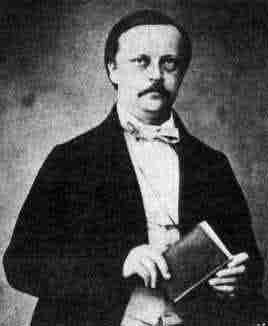

from http://www.norsktele.museum.no/filer_redaksjonelle/historie/Telefonen/oppfinnere%20og%20forskere-Hertz.htm
figure 1. (below)
from http://www.lahn-dill.com/johanneum/
 He
was born in Hamburg on 22 February 1857. His father Dr. jur. Gustav Ferdinand Hertz was Jewish, who had converted to
Christianity. He was an advocate in Hamburg, then Oberlandsgerichtsrat, and from
1887 Senator and head of the administration of justice. His mother Anna
Elisabeth, née Pfefferkorn, was the daughter of the Frankfurt doctor, Dr.
Pfefferkorn. As a child he was interested in practical things and equipped
his own workshop. At age of 15, he entered the Johanneum Gymnasium (figure
1). he passed his
Abitur (GCE A-levels), the best in his class. He showed an early interest in the
natural sciences, and a practical skill in building physics equipment in the
family workshop. He was also an enthusiastic linguist, learning Arabic and
Sanskrit. Three years later, he left schood and went to Frankfurt to gain practical experience
as the beginning of a career in engineering. In 1876 He went to Dresden Ploytechnic to work.
He entered Munich University to be a scientist rather than an engineer during
a year of compulsory military service from 1876 to 1877. In addition,
he began studies in mathematics, but switched to practical physics.
He
was born in Hamburg on 22 February 1857. His father Dr. jur. Gustav Ferdinand Hertz was Jewish, who had converted to
Christianity. He was an advocate in Hamburg, then Oberlandsgerichtsrat, and from
1887 Senator and head of the administration of justice. His mother Anna
Elisabeth, née Pfefferkorn, was the daughter of the Frankfurt doctor, Dr.
Pfefferkorn. As a child he was interested in practical things and equipped
his own workshop. At age of 15, he entered the Johanneum Gymnasium (figure
1). he passed his
Abitur (GCE A-levels), the best in his class. He showed an early interest in the
natural sciences, and a practical skill in building physics equipment in the
family workshop. He was also an enthusiastic linguist, learning Arabic and
Sanskrit. Three years later, he left schood and went to Frankfurt to gain practical experience
as the beginning of a career in engineering. In 1876 He went to Dresden Ploytechnic to work.
He entered Munich University to be a scientist rather than an engineer during
a year of compulsory military service from 1876 to 1877. In addition,
he began studies in mathematics, but switched to practical physics.
figure 2. Dr. Helmholtz
from http://physics.hallym.ac.kr/reference/physicist/Helmholtz.html
 He moved to Berlin in 1878
and he met Hermann Helmholtz (1821 - 1894) who immediately recognized his talents
and encouraged him greatly. He gained his PhD in 1880 and reminded at Berlin to work with Helmholtz as
his assistant. In 1883, Hertz moved to Kiel to lecture in physics. He began his studies of the recent electromagnetic theory of James Clerk
Maxwell.
He moved to Berlin in 1878
and he met Hermann Helmholtz (1821 - 1894) who immediately recognized his talents
and encouraged him greatly. He gained his PhD in 1880 and reminded at Berlin to work with Helmholtz as
his assistant. In 1883, Hertz moved to Kiel to lecture in physics. He began his studies of the recent electromagnetic theory of James Clerk
Maxwell.
figure3. Maxwell Theory in Mathematical Form
from
http://physics.hallym.ac.kr/reference/physicist/lines_menu.html#maxwell
Maxwell's theory had been based on unusual mechanical ideas about the luminiferous ether. and had not been
universally accepted. In 1884, Hertz rederived Maxwell's equations by
a new method, casting them in modern form without assumption of ether. However, the lack of a proper laboratory there caused him to take up the position of Professor of Physics at Karlsruhe and stayed for four years in 1885. In 1886 Hertz married Elizabeth Doll, daughter of a Karlsruhe professor; they had two daughters named Johanna and Mathilde. He discovered radio waves in 1888. In the same year, he began to suffer from toothache. In 1889 Hertz was appointed professor of physics at the University of Bonn and he continued his research on the discharge of electricity in rarefied gases. During the summer of 1892, he suffered from a bone disease and died of blood poisoning on 1 January 1894 at the early age of 36. His tragic early death occurred after several years of poor health and cut short a brilliant career. He is buried in the Jewish cemetery in Ohlsdorf.